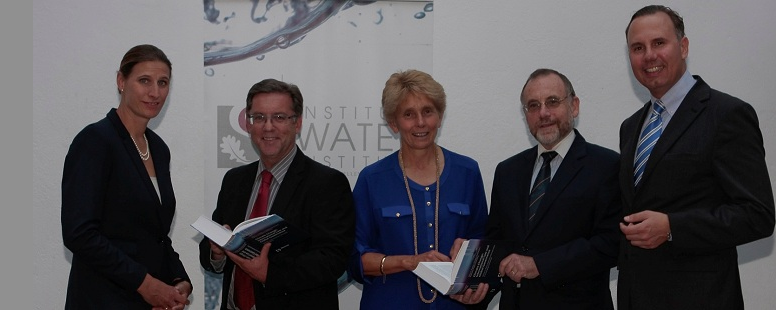“Disciplines have to work together in future to inform lawmakers and policymakers to craft laws that will lead to more safety, security and peace and more co-operation around the world.”
These were the words of Prof Oliver Ruppel, Professor of Law at the Faculty of Law at Stellenbosch University (SU) and co-editor of the two-volume publication Climate Change: International Law and Global Governance – at the launch of both the book and the Development of the Rule of Law Programme (DROP) – a newly established research unit at SU, which was held on 28 November 2013.

Dr Katharina Ruppel-Schlichting, Proff. Eugene Cloete, Sonia Human, Christian Roschman and Oliver Ruppel at the launch of both the Climate Change: International Law and Global Governance book and the Development of the Rule of Law Programme (DROP). Photo: Adrian Baillie-Stewart.
Ruppel, who is also Director of DROP, said: “The reason DROP was initiated was because the world has become extremely complex, uncertain and volatile. Issues such as the financial crisis, climate change and food insecurity are issues we will not be able to address sufficiently if we do not involve the law, because the law is a guiding hand and we will live in uncertainty if we do not use the law properly to regulate our lives.
“Drop is about shaping the law for the future and to do that we cannot continue to work in isolation. In order to craft the law for the future we must create interdisciplinary platforms that create synergies on the basis of which disciplines can cross fertilize each other.”
In her address Prof Sonia Human, Dean of the Faculty of Law, said that as a champion of children’s rights she is very excited about the launch of DROP, “because I am sure it will affect and improve the lives of future generations, especially those of children”.
Prof Eugene Cloete, SU Vice-Rector: Research and Innovation and Chairperson of the Water Institute, said: “After having a look at the content of these two volumes, I have no doubt that this will provide a solid base from which we can address climate change and other governance issues, also with regard to sustainability – not only in South Africa, but worldwide.”
Climate Change: International Law and Global Governance by Ruppel, Christian Roschmann and Katharina Ruppel-Schlichting, is one of the first academic attempts to systematically address both international climate change law and global climate change governance.
“International climate change law is not only a new and emerging legal discipline. In fact, climate change permeates public and private law, national and international law in many ways creating intersections of law in its diverse procedural and substantive fields,” explains Ruppel.
“The publication deals with international law and the multiple regulatory regimes dealing with climate change. International climate change law, global climate governance and diplomacy are interrelated and extremely complex. The publication explores these areas from a variety of doctrinal, trans-disciplinary and thematic perspectives.”
DROP is aimed at researching “sustainable development law and policy” focusing on reconciling the tension between environmental sustainability, economic development, and human welfare with a holistic view of current legal, political, economic, social and cultural developments. While focusing on issues of distributive justice it integrates public international law (i.e. international economic, social, and environmental law), regional and national law and policy with the goal of enhancing the rule of law around the world and reducing poverty in developing nations. Flagship areas are expected to tackle aquatic, oceanic, atmospheric and energy related justice questions.
The launch event was preceded by the first annual Climate Change and Water Trans-disciplinary Forum held at Stellenbosch University aimed at strengthening the exchange of multidisciplinary approaches in the water and climate change sector. Seven students from the Social Sciences, Natural Sciences, and Law, all based at Stellenbosch University, presented their research.
For more information on DROP or visit http://drop.sun.ac.za.
Author: Sonika Lamprecht

